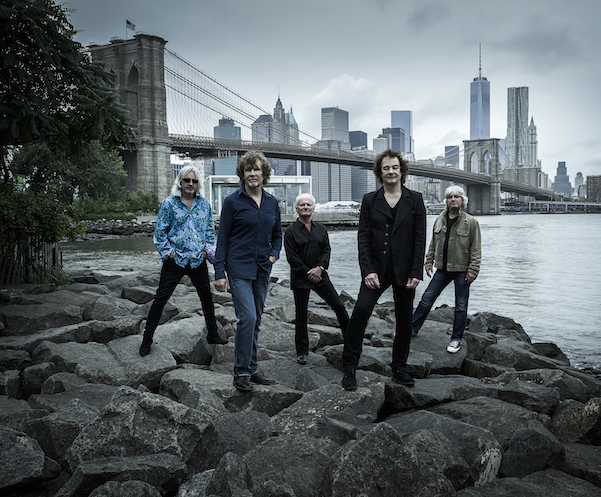Concert Review: The Zombies—Great Then and Great Now
I have a short list of the greatest singers I’ve seen live—Sandy Denny, Aaron Neville, Maddy Prior, the Everly Brothers—and Colin Blunstone of the Zombies is right up there.

The Zombies circa 2015. Photo: Andrew Eccles.
By Brett Milano
Let us now praise Colin Blunstone, the lead singer of England’s beloved Zombies. At the band’s Wilbur show this week, they jumped right into the deep end vocally with “I Love You,” a 1965 track that requires the singer to grab you with an unaccompanied shout (“And I don’t know…what to say!”) midway through the first chorus; either it falls flat or it makes your hair stand on end—and it didn’t fall flat. Blunstone embodies a particularly elegant, British brand of soul—his female equivalent would be the late Dusty Springfield—and he’s lost nothing; at age 70 he has more range and nuance than he had as a hitmaking youth. I have a short list of the greatest singers I’ve seen live—Sandy Denny, Aaron Neville, Maddy Prior, the Everly Brothers—and Blunstone is right up there.
Blunstone wasn’t the only wonderful thing about the Wilbur show: His longtime Zombies partner Rod Argent is in the top tier of British keyboardists, fully capable of doing the flashy prog-rock thing (which he did through the ‘70s with the band Argent), but with an R&B-inspired sense of groove. The two have led a revived Zombies lineup for the past decade, but this week they brought the band’s other surviving originals—bassist/singer Chris White and drummer Hugh Grundy (guitarist Paul Atkinson is deceased)—who joined the latter-day band to perform the 1968 album Odessey & Oracle in its entirety.
Odessey & Oracle (so called, no joke, because the original cover artist couldn’t spell “odyssey”) is one of those delayed-effect albums: Though its finale “Time of the Season” was a hit single, the album originally flopped and the band broke up before its release—hence it was never played live first time around. (It got rediscovered decades later, around the same time Love’s Forever Changes and the Big Star catalogue did). Like those albums, Odessey was somewhat out of its time: There is a bit of wide-eyed hippiedom, but it’s also full of melancholy and a bit of dark humor: The jubilant opener, “Care of Cell 44” is about welcoming one’s beloved home from prison; the rest of the story is left to the imagination.
On Tuesday the album was done faithfully, with a second keyboardist (Darian Sahanaja, Brian Wilson’s musical director for the past decade) adding the Mellotron backdrop for the proper unearthly feel. The reinststament of White’s voice and songs made a lot of difference, and this is an album that gained from being performed in order. In the final quarter alone, you had White’s haunting war ballad (“Butcher’s Tale,” about World War I, but with obvious Vietnam parallels) segueing into the reassuring “Friends of Mine,” and finally the heavenly vision of “Time of the Season”—a kaleidoscopic view of the late ‘60s in 10 minutes.
The opening set, featuring the latter-day Zombies (including longtime Kinks bassist Jim Rodford) included their other two ‘60s hits, “She’s Not There” and “Tell Her No,” plus Argent’s 1973 biggie “Hold Your Head Up” (where he took the night’s one chance for extended keyboard heroics). But much of the set was new, drawn from the just-released album Still Got That Hunger. And the new songs (one of which was about the band’s first trip to America in 1964) were more than solid; with more of an adult pop/R&B feel than the Odessey material but with the melodic twists that distinguish a Zombies song—and as always, the synchrony of Argent’s keys and Blunstone’s voice. It wasn’t great because it brought back memories or evoked a bygone era; it was great right now.
Brett Milano has been covering music in Boston for decades, and is the author of Vinyl Junkies: Adventures in Record Collecting (St. Martins, 2001) and The Sound of Our Town: A History of Boston Rock & Roll (Commonwealth Editions, 2007). He recently returned from New Orleans where he was editor of the music and culture magazine OffBeat.
Tagged: Brett Milano, Colin Blunstone, Odessey & Oracle, Rod Argent, Still Got That Hunger
